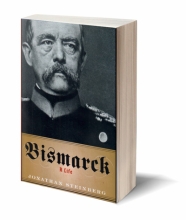Germany: United

Penn Arts and Sciences Magazine: Spring/Summer 2012 issue
by Greg Johnson
Otto von Bismarck is the man who created modern Germany. Although neither king nor soldier, he was able to unite Germany in the late 19th century into the European power that exists today.
"The office which German Chancellor Angela Merkel occupies is the office that Bismarck created," says Jonathan Steinberg, the Walter H. Annenberg Professor of Modern European History. Steinberg is the author of Bismarck: A Life—a book that Henry Kissinger called "the best study of its subject in the English language" in the pages of The New York Times.
Steinberg, who has been interested in Bismarck since studying German history as a Ph.D. student at Cambridge in 1962, says he finds the chancellor so fascinating because he was "many sided" and complicated. "He was dishonest on some occasions and frank and honest on others," he says.
Bismarck was never more than a soldier in the reserves but always wore a high officer's uniform. He was a hypochondriac and a glutton and had paranoid dreams about people trying to undermine him. "On the other hand, he was a great, great rationalist who saw the world very, very clearly," Steinberg says.
Bismarck served as chancellor of Germany from 1862 to 1890, mainly under William I, who died in 1888 at the age of 90. William I appointed Bismarck chancellor in order to resolve a political crisis with parliament. The king wanted to reform the army, but the parliament refused to appropriate the necessary funds unless they were given more say in affairs, which the king refused. In this deadlock, the king turned to Bismarck.
"He was the last possible choice," Steinberg says. Bismarck was a detested and loathed political figure with a terrible reputation. The army didn't trust him, and most of his early moves were hated by the population. He never had a parliament that supported him, and he was not a great outdoor speaker. Yet he was successful in unifying Germany and organized three successful wars.
Steinberg attributes Bismarck's achievements to his "public of one." As long as he had the support of the king, he could overcome his detractors. The king, Steinberg says, treated Bismarck "like a brilliant and difficult son." Chancellor Bismarck, in turn, treated the king "like a difficult and brilliant son would treat a father who is too weak to make the right decision."
"I think the key to their whole relationship is not the politics, but the relationship between the king and his minister," Steinberg says. He calls his book a kind of "psychological novel."





